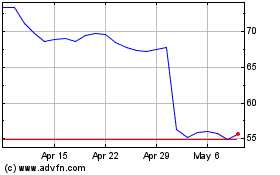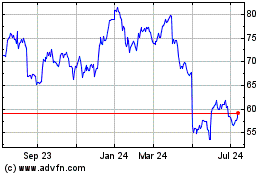By Anna Wilde Mathews
CVS Health Corp.'s announcement Monday that former Aetna Inc.
Chief Executive Mark Bertolini will leave the CVS board exposed
tensions underlying one of the biggest U.S. health-care
mergers.
Mr. Bertolini joined the board after the pharmacy operator paid
nearly $70 billion to buy the health insurer in 2018.
The two companies promised an ambitious health-care
transformation, melding their varied businesses of filling
prescriptions, managing drug benefits and providing health
insurance to reduce costs and improve customer experience.
Before the deal closed, Mr. Bertolini was a key voice in selling
the idea that the combined company could bring major changes to
health care. But afterward, Mr. Bertolini didn't retain an
executive role, instead joining a board dominated by CVS directors,
with the company led by CVS Chief Executive Larry Merlo.
Now, Mr. Bertolini says he is being pushed out, with the
integration of the two companies still not complete. CVS said he
would be leaving "following the successful integration of the Aetna
business."
"I was willing to continue to serve on the board of directors in
support of the most transformative effort in health care for our
nation. However, the board thought otherwise," Mr. Bertolini said
in an interview.
He said he would be departing when CVS was still digesting
Aetna's insurance business. "Integration is far from over," he
said.
Asked about his relationship with Mr. Merlo, he said, "There's
always going to be a natural tension between the current CEO and
the former CEO in any discussions regarding how you move the
strategy forward. He's the guy in the seat, I'm not."
Mr. Bertolini made the comments shortly after CVS announced that
he and two other directors won't stand for reelection. The company
said it was reducing the size of its board following
corporate-governance best practices.
CVS Chairman David Dorman said in a statement issued by the
company that the remaining board members strongly back management
and its direction.
"The integration has been a success and the board has the utmost
confidence in the current management team and the progress the
combined company has shown to date," a CVS spokesman said.
In 2017, the leadership of the two companies forged an unlikely
alliance. Mr. Merlo, a former pharmacist who has led CVS since
2011, had overseen the company's pharmacy-benefit manager,
Caremark, but didn't have a strong background in the
health-insurance business.
Mr. Bertolini, a longtime managed-care executive who had been
CEO of Aetna since 2010, was a high-profile corporate leader who
had long spoken about his own experiences with the health-care
system. And even after relinquishing his chief executive title, he
kept up his public activity, including publishing and promoting a
book on leadership.
The CVS-Aetna deal was always seen as a huge operational
challenge, as the companies would have to pull together vastly
different businesses, ranging from corner drugstores to Aetna's
Medicare and Medicaid coverage.
In his book published last year, Mr. Bertolini said the merger
would entail monitoring many details, requiring a "maniac with the
focus, the tenacity, and the urgency to resolve them all."
But, he wrote, "There was only room for one CEO, and Larry Merlo
was it. He had the bigger balance sheet, and his is the acquiring
company; so he deserves to lead the new organization."
Mr. Bertolini also wrote that if Aetna had completed a planned
acquisition of Humana Inc., which was blocked on antitrust grounds
before the CVS deal, he would have relished leading that combined
company.
Investors had mixed reactions to the CVS-Aetna deal, partly due
to concerns about the obstacles to integrating the various
businesses.
CVS shares fell sharply a year ago after the company issued a
downbeat earnings projection. Investors pressed for more detail
about the company's growth plans, and CVS promised it would return
to profit growth this year, accelerating in the future. Shares have
since risen as the company delivered stronger-than-expected results
in subsequent quarters.
CVS is in the process of opening around 1,500 health hub stores,
which are designed to offer a broader range of services than its
traditional drugstores, many aimed at people with chronic illnesses
such as diabetes.
George Hill, an analyst with Deutsche Bank, said investors now
have enough comfort with CVS's direction that Mr. Bertolini's
departure and comments won't disturb them, though he wrote that the
development might raise some eyebrows.
Matthew Borsch, an analyst with BMO Capital Markets, said
investors' view of CVS has brightened.
Yet, he said, Mr. Bertolini's unusual public statement, combined
with the recent departure of the company's president of pharmacy,
might "raise questions about whether everything is going as well as
management insists."
Strong headwinds remain. CVS, like competitor Walgreens Boots
Alliance Inc., faces pressure on margins in its retail pharmacy
business. Also, investors have pushed down shares of insurers over
political concerns, as Democratic presidential candidates advocate
for a major revamp of the U.S. health-care system.
And CVS faces the threat of an activist investor as a
shareholder. Starboard Value LP has taken a stake in CVS and held
talks with the company, The Wall Street Journal reported in
November, citing people familiar with the matter. Those talks had
been amicable, but Starboard is one of the top activist firms.
--Connie Driebusch contributed to this article.
Write to Anna Wilde Mathews at anna.mathews@wsj.com
(END) Dow Jones Newswires
February 03, 2020 19:14 ET (00:14 GMT)
Copyright (c) 2020 Dow Jones & Company, Inc.
CVS Health (NYSE:CVS)
Historical Stock Chart
From Mar 2024 to Apr 2024

CVS Health (NYSE:CVS)
Historical Stock Chart
From Apr 2023 to Apr 2024
